
 |
 Delicious Pancakes!: Quick and Easy Pancake Recipes by Les Ilagan English | September 6, 2015 | ISBN: 1517275997 | 171 pages | EPUB | 6.80 Mb Learn How to Make the Best PancakesPreparing meals for you and your family need not be a tedious task. There is nothing that can give such a rewarding feeling than seeing your loved ones enjoy eating what you have prepared for them.  Delectable Pasta by Les Ilagan English | September 2, 2015 | ISBN: 1517229367 | 122 pages | EPUB | 3.10 Mb This book offers a great collection of pasta recipes from traditional recipes to others that are exceptionally filling and rich in flavor. Pasta makes a great alternative to rice and other starchy foods that give us energy. It is very filling too that is why it can get you a long way without feeling hungry. So what are you waiting for? Go ahead and try one of the recipes here on your next meal and surely your family and friends will be delighted!  Decontamination of Warfare Agents: Enzymatic Methods for the Removal of B/C Weapons By 2008 | 312 Pages | ISBN: 3527317562 | PDF | 4 MB Based on results previously restricted for military use and inaccessible to the public, this practice-oriented handbook introduces the use of enzymes for fast and efficient decontamination of B/C weapons in various scenarios, including terrorist attacks. It draws on the internationally recognized technological leadership of the German armed forces, whose anti-B/C technology is among the most advanced worldwide. The text is rounded off with a look at future perspectives.Content: Chapter 1 The History of Biological Warfare (pages 1-10): Friedrich FrischknechtChapter 2 History of Chemical Warfare (pages 11-19): Dr. Andre RichardtChapter 3 Monitoring and New Threats of Chemical/Biological Weapons (pages 21-33): Dr. Andre Richardt and Roland DiersteinChapter 4 Biological Warfare Agents (pages 35-54): Heiko Russmann and Dr. Andre RichardtChapter 5 Chemical Warfare Agents (pages 55-66): Alexander Grabowski, Dr. Andre Richardt and Dr. Marc?Michael BlumChapter 6 Decontamination of Biological Warfare Agents (pages 67-82): Barbel Niederwohrmeier and Dr. Andre RichardtChapter 7 Decontamination of Chemical Warfare Agents (pages 83-115): Hans?Jurgen Altmann and Dr. Andre RichardtChapter 8 A Short Introduction to Enzyme Catalysis (pages 117-134): Dr. Marc?Michael BlumChapter 9 Hydrolytic Enzymes for Chemical Warfare Agent Decontamination (pages 135-162): Dr. Marc?Michael Blum and Dr. Andre RichardtChapter 10 Laccases-Oxidative Enzymes for Bioremediation of Xenotics and Inactivation of Bacillus Spores (pages 163-200): Barbel Niederwohrmeier, Lars Ostergaard, Dr. Andre Richardt and Steffen DanielsenChapter 11 Medical Aspects of Chemical Warfare Agents (pages 201-221): Kai Kehe, Franz Worek and Horst ThiermannChapter 12 Microemulsions: A Versatile Carrier for Decontamination Agents (pages 223-251): Thomas Hellweg, Stefan Wellert, S. J. Mitchell and Dr. Andre RichardtChapter 13 Immobilization of Enzymes (pages 253-271): Birgit Hulseweh, Dr. Andre Richardt and Bernd NiemeyerChapter 14 Road Ahead (pages 273-287): Dr. Marc?Michael Blum, Heiko Russmann and Dr. Andre Richardt 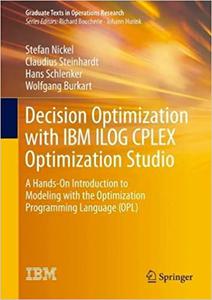 Decision Optimization with IBM ILOG CPLEX Optimization Studio: A Hands-On Introduction to Modeling with the Optimization Programming Language (OPL) English | 2022 | ISBN: 3662654806 | 279 Pages | PDF (True) | 7 MB 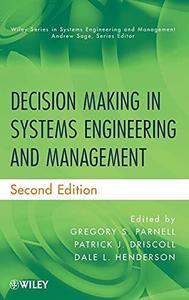 Decision Making in Systems Engineering and Management, Second Edition By 2010 | 530 Pages | ISBN: 0470900423 | PDF | 15 MB Decision Making in Systems Engineering and Management is a comprehensive textbook that provides a logical process and analytical techniques for fact-based decision making for the most challenging systems problems. Grounded in systems thinking and based on sound systems engineering principles, the systems decisions process (SDP) leverages multiple objective decision analysis, multiple attribute value theory, and value-focused thinking to define the problem, measure stakeholder value, design creative solutions, explore the decision trade off space in the presence of uncertainty, and structure successful solution implementation. In addition to classical systems engineering problems, this approach has been successfully applied to a wide range of challenges including personnel recruiting, retention, and management; strategic policy analysis; facilities design and management; resource allocation; information assurance; security systems design; and other settings whose structure can be conceptualized as a system.Content: Chapter 1 Introduction (pages 1-24): Gregory S. Parnell and Patrick J. DriscollChapter 2 Systems Thinking (pages 25-64): Patrick J. DriscollChapter 3 System Life Cycle (pages 65-93): Patrick J. Driscoll and Paul KucikChapter 4 Systems Modeling and Analysis (pages 95-135): Paul D. West, John E. Kobza and Simon R. GoergerChapter 5 Life Cycle Costing (pages 137-181): Edward Pohl and Heather NachtmannChapter 6 Introduction to Systems Engineering (pages 183-195): Gregory S. ParnellChapter 7 Systems Engineering in Professional Practice (pages 197-226): Roger C. BurkChapter 8 System Reliability (pages 227-272): Edward PohlChapter 9 Systems Decision Process Overview (pages 273-295): Gregory S. Parnell and Paul D. WestChapter 10 Problem Definition (pages 297-352): Timothy Trainor and Gregory S. ParnellChapter 11 Solution Design (pages 353-393): Paul D. WestChapter 12 Decision Making (pages 395-446): Michael J. Kwinn, Gregory S. Parnell and Robert A. DeesChapter 13 Solution Implementation (pages 447-476): Kenneth W. McDonald and Daniel J. McCarthyChapter 14 Summary (pages 477-483): Gregory S. Parnell  Death of the Chesapeake: A History of the Military's Role in Polluting the Bay By Richard D. Albright(auth.) 2013 | 211 Pages | ISBN: 1118686276 | PDF | 7 MB In essence this book deals with an area that contributes significantly to the pollution and degradation of Chesapeake Bay, but has been completely overlooked in many of the efforts to restore the Bay, specifically, the federal military pollution sources. The book also recognizes for the first time, that efforts to restore the Bay have failed because of violation of a fundamental precept of environmental cleanup; that is, to sample the site and see what is there. The Bay itself has never been sampled. Thus this book presents a view of the environmental condition of Chesapeake Bay that is totally unique. It covers a part of the history of the Bay that is not widely known, including how the Bay was formed. It presents a mixture of science, military history, and novel solutions to the Bay's degradation.In so doing, the author examines the military use of the Bay and reveals the extent of munitions dumpsites containing nitrogen and phosphorus as well as chemical warfare material, and how this is effecting the environment. The book concludes with the author's own clean-up plan that, if implemented, would go a long way to restoring health to Bay.The book is supplemented with many photographs and maps.Content: Chapter 1 The Formation of the Bay and Its Drainage Area (pages 1-5): Chapter 2 Nutrient Dynamics, Depletion, and Replenishment (pages 7-13): Chapter 3 Safety Issues with Old Munitions (pages 15-27): Chapter 4 Artillery Shells in the Bay (pages 29-37): Chapter 5 Bombs in the Bay (pages 39-54): Chapter 6 Mines and Torpedoes in the Bay (pages 55-59): Chapter 7 Military Munitions and Explosives Factories (pages 61-64): Chapter 8 Contamination from Military Constituents Leading to Environmental and Human Health Concerns (pages 65-77): Chapter 9 Chemical Weapons Sites on Chesapeake Bay or in the Watershed (pages 79-105): Chapter 10 Military Facilities Grouped by Specific Areas or on Specific Rivers (pages 107-135): Chapter 11 Radioactive Contamination (pages 137-139): Chapter 12 PCB and Other Ship Contamination (pages 141-147): Chapter 13 Environmental Justice (pages 149-151): Chapter 14 Cleaning Up the Bay's Munitons (pages 153-158): 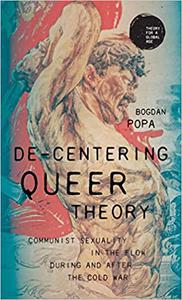 Bogdan Popa, "De-centering queer theory: Communist sexuality in the flow during and after the Cold War " English | ISBN: 1526156954 | 2021 | 256 pages | PDF | 2 MB De-centering queer theory seeks to reorient queer theory to a different conception of bodies and sexuality derived from Eastern European Marxism. The book articulates a contrast between the concept of the productive body, which draws its epistemology from Soviet and avant-garde theorists, and Cold War gender, which is defined as the social construction of the body. The first part of the book concentrates on the theoretical and visual production of Eastern European Marxism, which proposed an alternative version of sexuality to that of western liberalism. In doing so it offers a historical angle to understand the emergence not only of an alternative epistemology, but also of queer theory's vocabulary. The second part of the book provides a Marxist, anti-capitalist archive for queer studies, which often neglects to engage critically with its liberal and Cold War underpinnings. 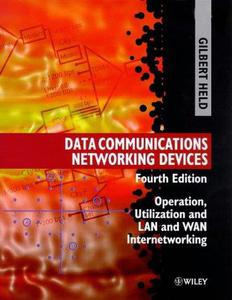 Data Communications Networking Devices: Operation, Utilization and LAN and WAN Internetworking, Fourth Edition By Gilbert Held(auth.) 1998 | 872 Pages | ISBN: 047197515X | PDF | 6 MB Data Communications Networking Devices Operation, Utilization and LAN and VAN Internetworking Fourth Edition Gilbert Held 4-Degree Consulting, Macon, Georgia, USA Data communications continue to grow enormously as a key part of telecommunications. Technological advances mean up-to-date information is essential. This fourth edition of the popular and authoritative text Data Communications Networking Devices examines the characteristics, operation and applications of the devices used to construct a data communications network. It enables readers to operate and utilize the networking devices used in the design, modification or optimization of a data communications network. Features include: * Extensive coverage of the fundamental concepts of data communications * New sections on ATM/broadband networking, LAN/WAN switches and new examples of network integration devices * Examination of the specialized devices such as security devices, LZW compression and voice digitizers * Discusses the different types of networks, network architecture and the flow of data between several networks * Questions at the end of each chapter to assist understanding. More than a comprehensive reference book, Data Communications Networking Devices is ideal as a self study guide too. It is essential reading for network managers and telecommunications engineers, data processing managers and information system managers. Visit Our Web Page! http://www.wiley.com/Content: Chapter 1 Fundamental Wide Area Networking Concepts (pages 1-169): Chapter 2 Wide Area Networks (pages 171-268): Chapter 3 Local Area Networks (pages 269-349): Chapter 4 Wide Area Network Transmission Equipment (pages 351-537): Chapter 5 LAN Internetworking Devices (pages 539-623): Chapter 6 Wide Area Network Data Concentration Equipment (pages 625-739): Chapter 7 Specialized Devices (pages 741-812):  Data Analysis in Vegetation Ecology, Second Edition By Otto Wildi(auth.) 2013 | 314 Pages | ISBN: 1118384040 | PDF | 4 MB The first edition of Data Analysis in Vegetation Ecology provided an accessible and thorough resource for evaluating plant ecology data, based on the author's extensive experience of research and analysis in this field. Now, the Second Edition expands on this by not only describing how to analyse data, but also enabling readers to follow the step-by-step case studies themselves using the freely available statistical package R. The addition of R in this new edition has allowed coverage of additional methods for classification and ordination, and also logistic regression, GLMs, GAMs, regression trees as well as multinomial regression to simulate vegetation types. A package of statistical functions, specifically written for the book, covers topics not found elsewhere, such as analysis and Description routines for handling synoptic tables. All data sets presented in the book are now also part of the R package 'dave', which is freely available online at the R Archive webpage.The book and data analysis tools combined provide a complete and comprehensive guide to carrying out data analysis students, researchers and practitioners in vegetation science and plant ecology.Summary:A completely revised and updated edition of this popular introduction to data analysis in vegetation ecologyNow includes practical examples using the freely available statistical package 'R'Written by a world renowned expert in the fieldComplex concepts and operations are explained using clear illustrations and case studies relating to real world phenomenaHighlights both the potential and limitations of the methods used, and the final interpretationsGives suggestions on the use of the most widely used statistical software in vegetation ecology and how to start analysing dataPraise for the first edition:"This book will be a valuable addition to the shelves of early postgraduate candidates and postdoctoral researchers. Through the excellent background material and use of real world examples, Wildi has taken the fear out of trying to understand these much needed data analysis techniques in vegetation ecology." Austral EcologyContent: Chapter 1 Introduction (pages 1-4): Chapter 2 Patterns in Vegetation Ecology (pages 5-21): Chapter 3 Transformation (pages 23-35): Chapter 4 Multivariate Comparison (pages 37-52): Chapter 5 Classification (pages 53-69): Chapter 6 Ordination (pages 71-107): Chapter 7 Ecological Patterns (pages 109-154): Chapter 8 Static Predictive Modelling (pages 155-183): Chapter 9 Vegetation Change in Time (pages 185-212): Chapter 10 Dynamic Modelling (pages 213-231): Chapter 11 Large Data Sets: Wetland Patterns (pages 233-253): Chapter 12 Swiss Forests: A Case Study (pages 255-279): 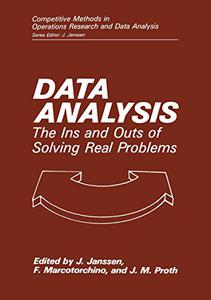 Data Analysis: The Ins and Outs of Solving Real Problems by Jacques Janssen, F. Marcotorchino, J. M. Proth English | PDF | 1987 | 370 Pages | ISBN : 0306426129 | 14.1 MB This book is the result of the fourth International Symposium on Data Analysis held on June 1985 at the Universite Libre de Bruxelles with the help'of the European Institute for Advanced Management. As the preceding ones, the organization of the Symposium started with a call for real life problems from which an International Com mittee selected six topics and asked for several solutions. These topics are : I) Multivariate and longitudinal data on growing children 2) Prehistoric assemblages and lithic artifacts from a small We- european area 3) A comparison of results of European elections 4) Classification of heterogeneous data related to microcomputers 5) Group technology in production management 6) |